Australian Engineering Practice 3: Teamwork, Self-Review, and Learning
VerifiedAdded on 2021/05/30
|8
|2048
|32
Report
AI Summary
This report examines the impact of collaborative teamwork, self-review, self-management, and lifelong learning within the context of Australian engineering practice. It highlights the positive impacts of teamwork, such as efficient division of labor, enhanced learning, and improved skills, while also addressing potential drawbacks like blame games and clashes of ideas. The report then delves into the importance of self-review, self-management, and lifelong learning as essential qualities for professional development, emphasizing their role in career advancement and problem-solving. It discusses how these qualities contribute to effective time management, experience, and the ability to work independently. Finally, the report underscores the benefits of continuous learning, including financial advantages and improved self-management skills, concluding that a balanced approach to self-assessment and lifelong learning is crucial for achieving optimal results in engineering.
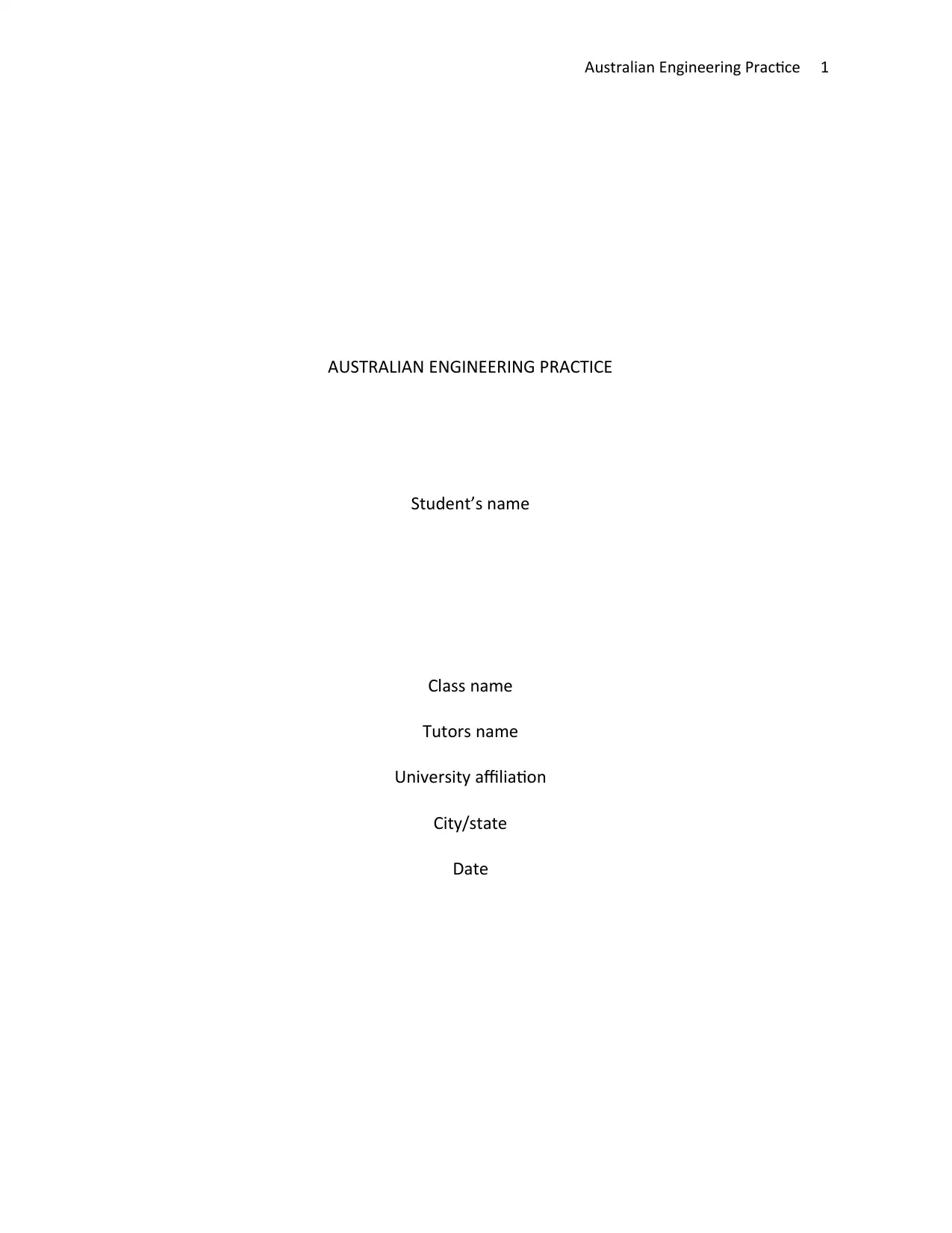
Australian Engineering Practice 1
AUSTRALIAN ENGINEERING PRACTICE
Student’s name
Class name
Tutors name
University affiliation
City/state
Date
AUSTRALIAN ENGINEERING PRACTICE
Student’s name
Class name
Tutors name
University affiliation
City/state
Date
Paraphrase This Document
Need a fresh take? Get an instant paraphrase of this document with our AI Paraphraser
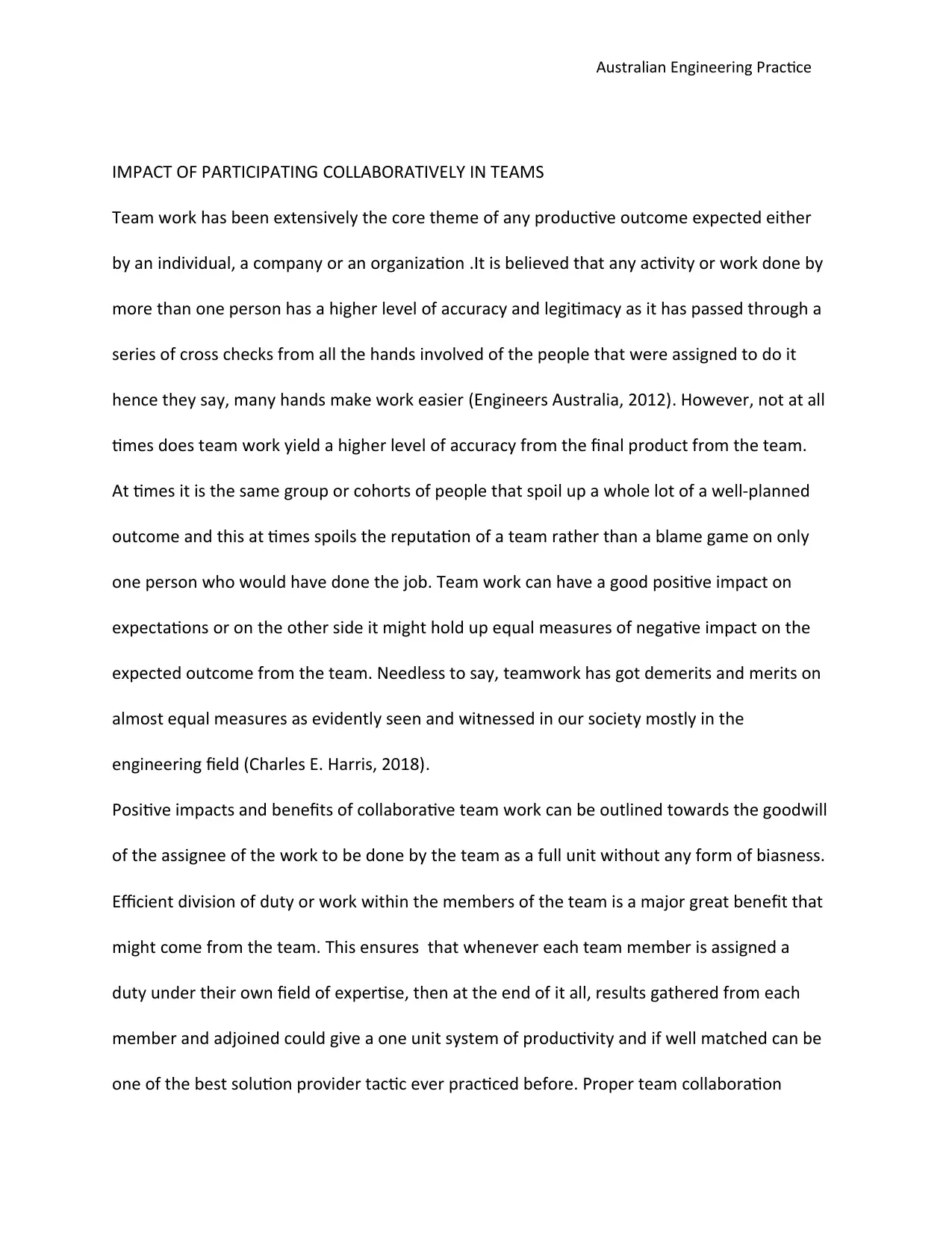
Australian Engineering Practice
IMPACT OF PARTICIPATING COLLABORATIVELY IN TEAMS
Team work has been extensively the core theme of any productive outcome expected either
by an individual, a company or an organization .It is believed that any activity or work done by
more than one person has a higher level of accuracy and legitimacy as it has passed through a
series of cross checks from all the hands involved of the people that were assigned to do it
hence they say, many hands make work easier (Engineers Australia, 2012). However, not at all
times does team work yield a higher level of accuracy from the final product from the team.
At times it is the same group or cohorts of people that spoil up a whole lot of a well-planned
outcome and this at times spoils the reputation of a team rather than a blame game on only
one person who would have done the job. Team work can have a good positive impact on
expectations or on the other side it might hold up equal measures of negative impact on the
expected outcome from the team. Needless to say, teamwork has got demerits and merits on
almost equal measures as evidently seen and witnessed in our society mostly in the
engineering field (Charles E. Harris, 2018).
Positive impacts and benefits of collaborative team work can be outlined towards the goodwill
of the assignee of the work to be done by the team as a full unit without any form of biasness.
Efficient division of duty or work within the members of the team is a major great benefit that
might come from the team. This ensures that whenever each team member is assigned a
duty under their own field of expertise, then at the end of it all, results gathered from each
member and adjoined could give a one unit system of productivity and if well matched can be
one of the best solution provider tactic ever practiced before. Proper team collaboration
IMPACT OF PARTICIPATING COLLABORATIVELY IN TEAMS
Team work has been extensively the core theme of any productive outcome expected either
by an individual, a company or an organization .It is believed that any activity or work done by
more than one person has a higher level of accuracy and legitimacy as it has passed through a
series of cross checks from all the hands involved of the people that were assigned to do it
hence they say, many hands make work easier (Engineers Australia, 2012). However, not at all
times does team work yield a higher level of accuracy from the final product from the team.
At times it is the same group or cohorts of people that spoil up a whole lot of a well-planned
outcome and this at times spoils the reputation of a team rather than a blame game on only
one person who would have done the job. Team work can have a good positive impact on
expectations or on the other side it might hold up equal measures of negative impact on the
expected outcome from the team. Needless to say, teamwork has got demerits and merits on
almost equal measures as evidently seen and witnessed in our society mostly in the
engineering field (Charles E. Harris, 2018).
Positive impacts and benefits of collaborative team work can be outlined towards the goodwill
of the assignee of the work to be done by the team as a full unit without any form of biasness.
Efficient division of duty or work within the members of the team is a major great benefit that
might come from the team. This ensures that whenever each team member is assigned a
duty under their own field of expertise, then at the end of it all, results gathered from each
member and adjoined could give a one unit system of productivity and if well matched can be
one of the best solution provider tactic ever practiced before. Proper team collaboration
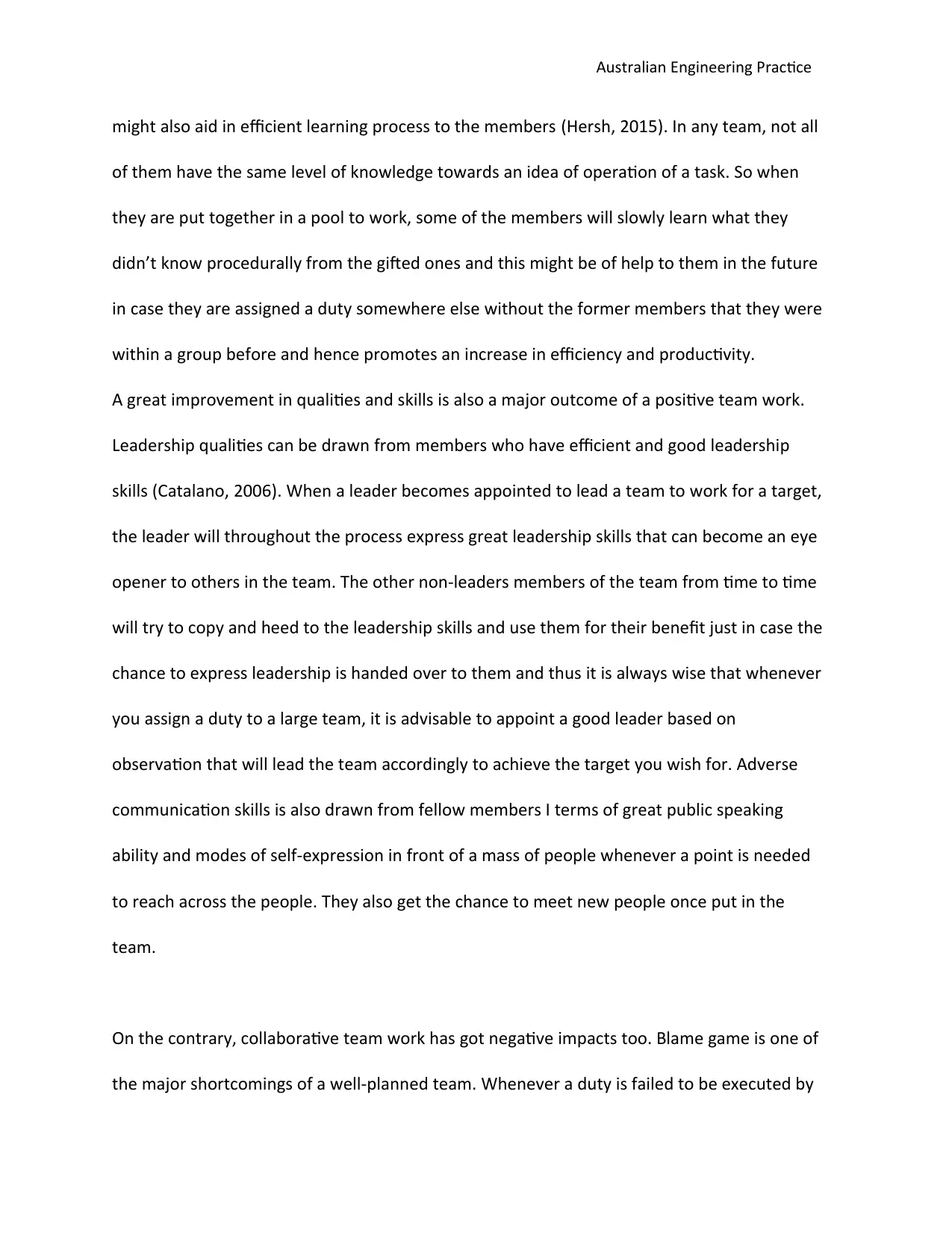
Australian Engineering Practice
might also aid in efficient learning process to the members (Hersh, 2015). In any team, not all
of them have the same level of knowledge towards an idea of operation of a task. So when
they are put together in a pool to work, some of the members will slowly learn what they
didn’t know procedurally from the gifted ones and this might be of help to them in the future
in case they are assigned a duty somewhere else without the former members that they were
within a group before and hence promotes an increase in efficiency and productivity.
A great improvement in qualities and skills is also a major outcome of a positive team work.
Leadership qualities can be drawn from members who have efficient and good leadership
skills (Catalano, 2006). When a leader becomes appointed to lead a team to work for a target,
the leader will throughout the process express great leadership skills that can become an eye
opener to others in the team. The other non-leaders members of the team from time to time
will try to copy and heed to the leadership skills and use them for their benefit just in case the
chance to express leadership is handed over to them and thus it is always wise that whenever
you assign a duty to a large team, it is advisable to appoint a good leader based on
observation that will lead the team accordingly to achieve the target you wish for. Adverse
communication skills is also drawn from fellow members I terms of great public speaking
ability and modes of self-expression in front of a mass of people whenever a point is needed
to reach across the people. They also get the chance to meet new people once put in the
team.
On the contrary, collaborative team work has got negative impacts too. Blame game is one of
the major shortcomings of a well-planned team. Whenever a duty is failed to be executed by
might also aid in efficient learning process to the members (Hersh, 2015). In any team, not all
of them have the same level of knowledge towards an idea of operation of a task. So when
they are put together in a pool to work, some of the members will slowly learn what they
didn’t know procedurally from the gifted ones and this might be of help to them in the future
in case they are assigned a duty somewhere else without the former members that they were
within a group before and hence promotes an increase in efficiency and productivity.
A great improvement in qualities and skills is also a major outcome of a positive team work.
Leadership qualities can be drawn from members who have efficient and good leadership
skills (Catalano, 2006). When a leader becomes appointed to lead a team to work for a target,
the leader will throughout the process express great leadership skills that can become an eye
opener to others in the team. The other non-leaders members of the team from time to time
will try to copy and heed to the leadership skills and use them for their benefit just in case the
chance to express leadership is handed over to them and thus it is always wise that whenever
you assign a duty to a large team, it is advisable to appoint a good leader based on
observation that will lead the team accordingly to achieve the target you wish for. Adverse
communication skills is also drawn from fellow members I terms of great public speaking
ability and modes of self-expression in front of a mass of people whenever a point is needed
to reach across the people. They also get the chance to meet new people once put in the
team.
On the contrary, collaborative team work has got negative impacts too. Blame game is one of
the major shortcomings of a well-planned team. Whenever a duty is failed to be executed by
⊘ This is a preview!⊘
Do you want full access?
Subscribe today to unlock all pages.

Trusted by 1+ million students worldwide
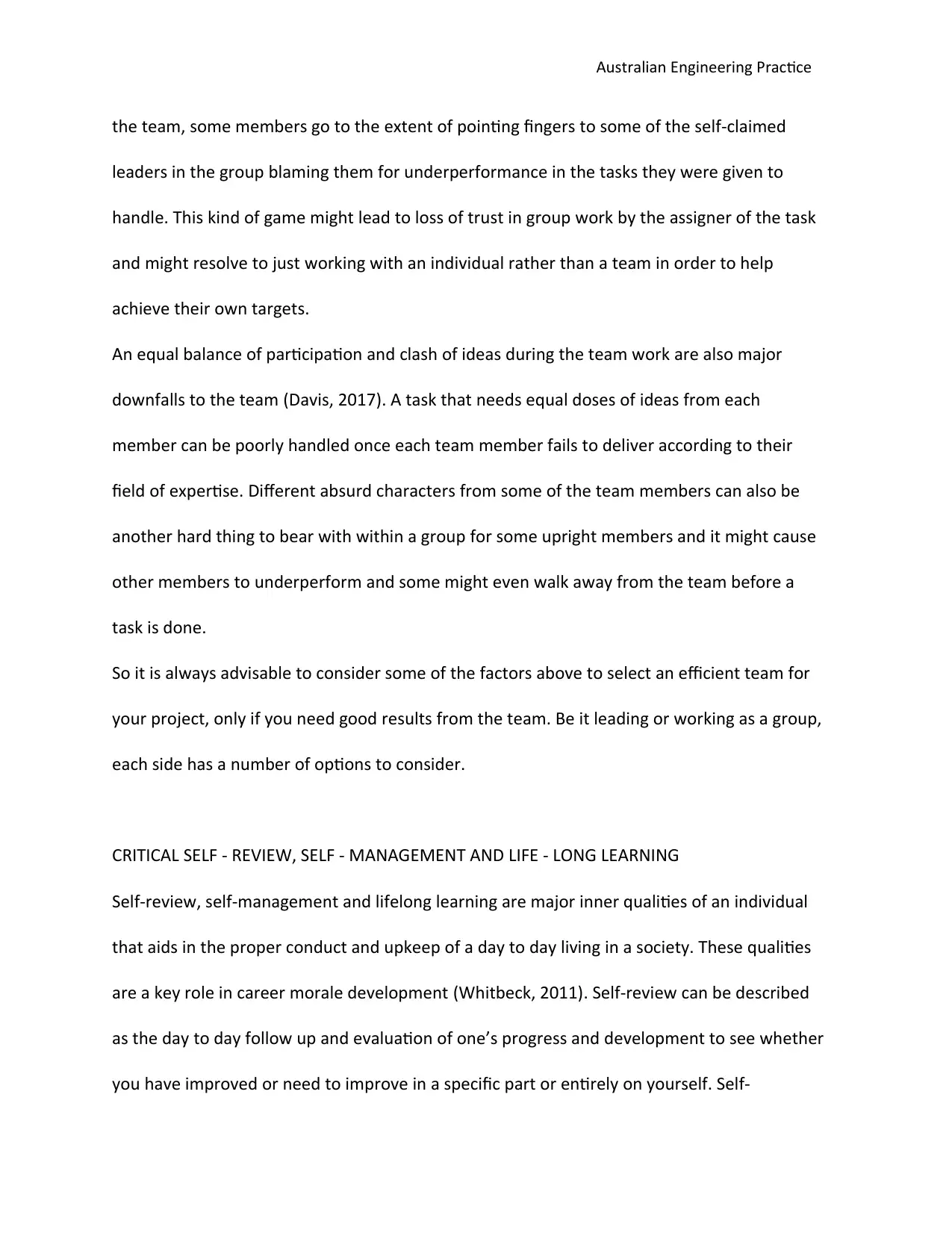
Australian Engineering Practice
the team, some members go to the extent of pointing fingers to some of the self-claimed
leaders in the group blaming them for underperformance in the tasks they were given to
handle. This kind of game might lead to loss of trust in group work by the assigner of the task
and might resolve to just working with an individual rather than a team in order to help
achieve their own targets.
An equal balance of participation and clash of ideas during the team work are also major
downfalls to the team (Davis, 2017). A task that needs equal doses of ideas from each
member can be poorly handled once each team member fails to deliver according to their
field of expertise. Different absurd characters from some of the team members can also be
another hard thing to bear with within a group for some upright members and it might cause
other members to underperform and some might even walk away from the team before a
task is done.
So it is always advisable to consider some of the factors above to select an efficient team for
your project, only if you need good results from the team. Be it leading or working as a group,
each side has a number of options to consider.
CRITICAL SELF - REVIEW, SELF - MANAGEMENT AND LIFE - LONG LEARNING
Self-review, self-management and lifelong learning are major inner qualities of an individual
that aids in the proper conduct and upkeep of a day to day living in a society. These qualities
are a key role in career morale development (Whitbeck, 2011). Self-review can be described
as the day to day follow up and evaluation of one’s progress and development to see whether
you have improved or need to improve in a specific part or entirely on yourself. Self-
the team, some members go to the extent of pointing fingers to some of the self-claimed
leaders in the group blaming them for underperformance in the tasks they were given to
handle. This kind of game might lead to loss of trust in group work by the assigner of the task
and might resolve to just working with an individual rather than a team in order to help
achieve their own targets.
An equal balance of participation and clash of ideas during the team work are also major
downfalls to the team (Davis, 2017). A task that needs equal doses of ideas from each
member can be poorly handled once each team member fails to deliver according to their
field of expertise. Different absurd characters from some of the team members can also be
another hard thing to bear with within a group for some upright members and it might cause
other members to underperform and some might even walk away from the team before a
task is done.
So it is always advisable to consider some of the factors above to select an efficient team for
your project, only if you need good results from the team. Be it leading or working as a group,
each side has a number of options to consider.
CRITICAL SELF - REVIEW, SELF - MANAGEMENT AND LIFE - LONG LEARNING
Self-review, self-management and lifelong learning are major inner qualities of an individual
that aids in the proper conduct and upkeep of a day to day living in a society. These qualities
are a key role in career morale development (Whitbeck, 2011). Self-review can be described
as the day to day follow up and evaluation of one’s progress and development to see whether
you have improved or need to improve in a specific part or entirely on yourself. Self-
Paraphrase This Document
Need a fresh take? Get an instant paraphrase of this document with our AI Paraphraser
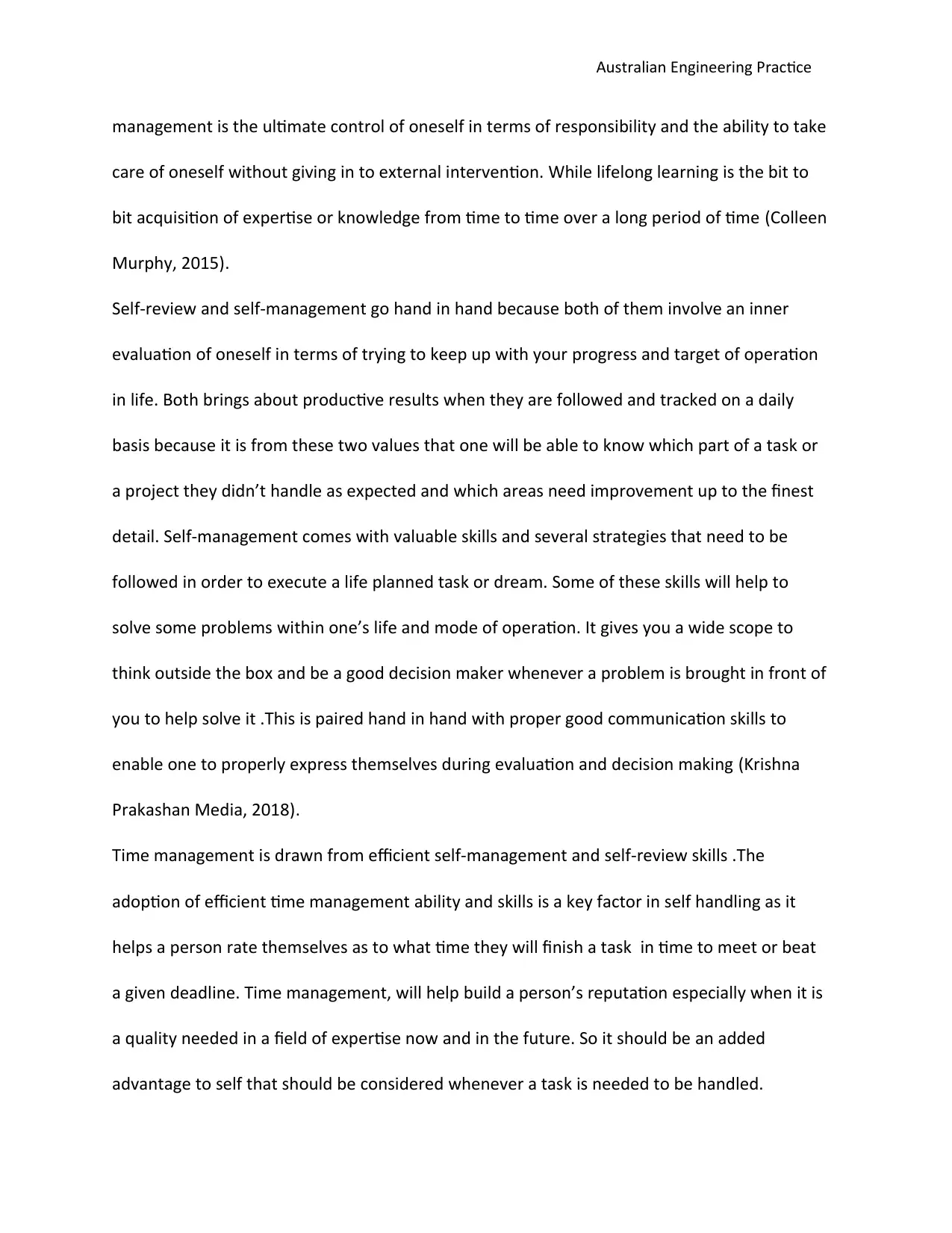
Australian Engineering Practice
management is the ultimate control of oneself in terms of responsibility and the ability to take
care of oneself without giving in to external intervention. While lifelong learning is the bit to
bit acquisition of expertise or knowledge from time to time over a long period of time (Colleen
Murphy, 2015).
Self-review and self-management go hand in hand because both of them involve an inner
evaluation of oneself in terms of trying to keep up with your progress and target of operation
in life. Both brings about productive results when they are followed and tracked on a daily
basis because it is from these two values that one will be able to know which part of a task or
a project they didn’t handle as expected and which areas need improvement up to the finest
detail. Self-management comes with valuable skills and several strategies that need to be
followed in order to execute a life planned task or dream. Some of these skills will help to
solve some problems within one’s life and mode of operation. It gives you a wide scope to
think outside the box and be a good decision maker whenever a problem is brought in front of
you to help solve it .This is paired hand in hand with proper good communication skills to
enable one to properly express themselves during evaluation and decision making (Krishna
Prakashan Media, 2018).
Time management is drawn from efficient self-management and self-review skills .The
adoption of efficient time management ability and skills is a key factor in self handling as it
helps a person rate themselves as to what time they will finish a task in time to meet or beat
a given deadline. Time management, will help build a person’s reputation especially when it is
a quality needed in a field of expertise now and in the future. So it should be an added
advantage to self that should be considered whenever a task is needed to be handled.
management is the ultimate control of oneself in terms of responsibility and the ability to take
care of oneself without giving in to external intervention. While lifelong learning is the bit to
bit acquisition of expertise or knowledge from time to time over a long period of time (Colleen
Murphy, 2015).
Self-review and self-management go hand in hand because both of them involve an inner
evaluation of oneself in terms of trying to keep up with your progress and target of operation
in life. Both brings about productive results when they are followed and tracked on a daily
basis because it is from these two values that one will be able to know which part of a task or
a project they didn’t handle as expected and which areas need improvement up to the finest
detail. Self-management comes with valuable skills and several strategies that need to be
followed in order to execute a life planned task or dream. Some of these skills will help to
solve some problems within one’s life and mode of operation. It gives you a wide scope to
think outside the box and be a good decision maker whenever a problem is brought in front of
you to help solve it .This is paired hand in hand with proper good communication skills to
enable one to properly express themselves during evaluation and decision making (Krishna
Prakashan Media, 2018).
Time management is drawn from efficient self-management and self-review skills .The
adoption of efficient time management ability and skills is a key factor in self handling as it
helps a person rate themselves as to what time they will finish a task in time to meet or beat
a given deadline. Time management, will help build a person’s reputation especially when it is
a quality needed in a field of expertise now and in the future. So it should be an added
advantage to self that should be considered whenever a task is needed to be handled.
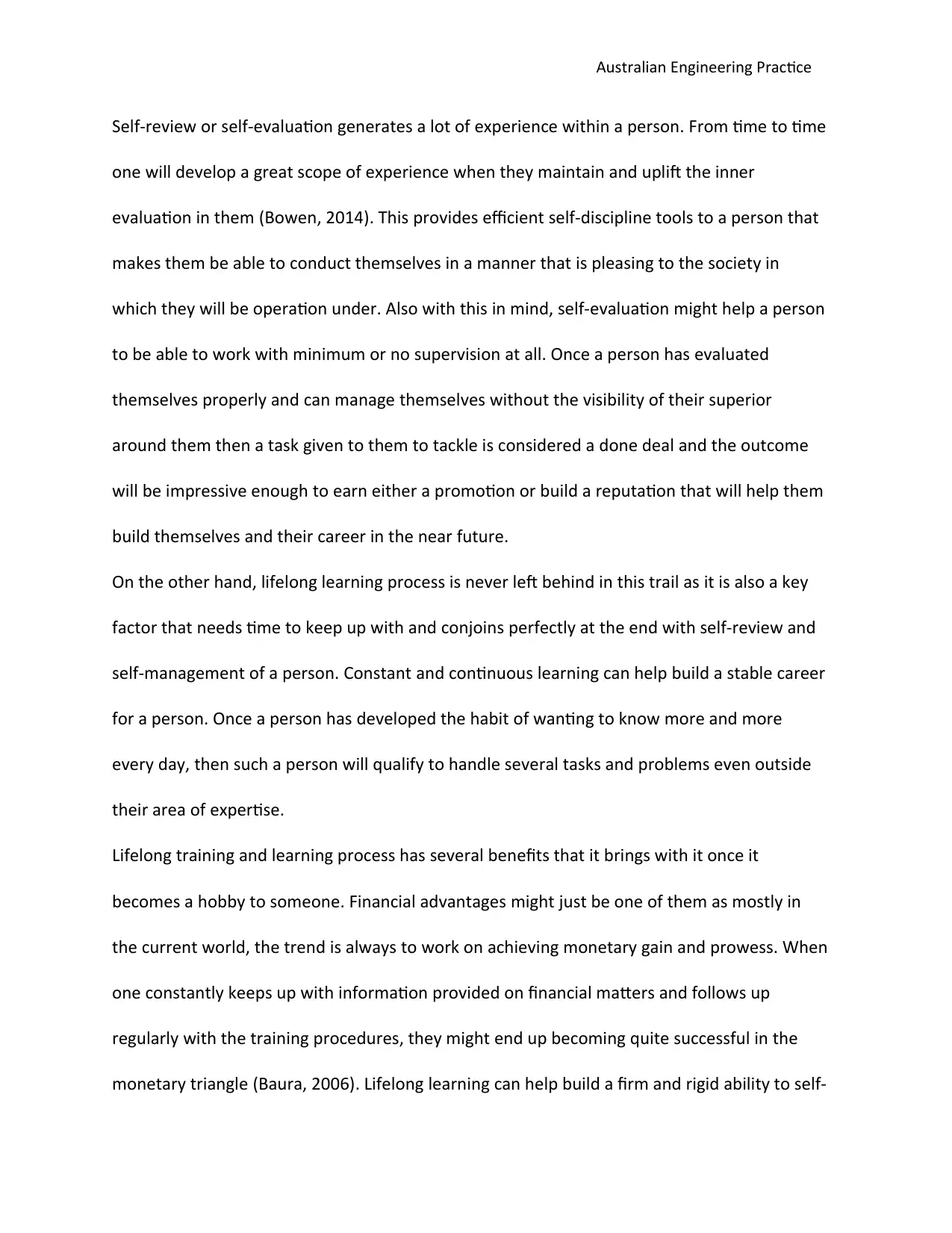
Australian Engineering Practice
Self-review or self-evaluation generates a lot of experience within a person. From time to time
one will develop a great scope of experience when they maintain and uplift the inner
evaluation in them (Bowen, 2014). This provides efficient self-discipline tools to a person that
makes them be able to conduct themselves in a manner that is pleasing to the society in
which they will be operation under. Also with this in mind, self-evaluation might help a person
to be able to work with minimum or no supervision at all. Once a person has evaluated
themselves properly and can manage themselves without the visibility of their superior
around them then a task given to them to tackle is considered a done deal and the outcome
will be impressive enough to earn either a promotion or build a reputation that will help them
build themselves and their career in the near future.
On the other hand, lifelong learning process is never left behind in this trail as it is also a key
factor that needs time to keep up with and conjoins perfectly at the end with self-review and
self-management of a person. Constant and continuous learning can help build a stable career
for a person. Once a person has developed the habit of wanting to know more and more
every day, then such a person will qualify to handle several tasks and problems even outside
their area of expertise.
Lifelong training and learning process has several benefits that it brings with it once it
becomes a hobby to someone. Financial advantages might just be one of them as mostly in
the current world, the trend is always to work on achieving monetary gain and prowess. When
one constantly keeps up with information provided on financial matters and follows up
regularly with the training procedures, they might end up becoming quite successful in the
monetary triangle (Baura, 2006). Lifelong learning can help build a firm and rigid ability to self-
Self-review or self-evaluation generates a lot of experience within a person. From time to time
one will develop a great scope of experience when they maintain and uplift the inner
evaluation in them (Bowen, 2014). This provides efficient self-discipline tools to a person that
makes them be able to conduct themselves in a manner that is pleasing to the society in
which they will be operation under. Also with this in mind, self-evaluation might help a person
to be able to work with minimum or no supervision at all. Once a person has evaluated
themselves properly and can manage themselves without the visibility of their superior
around them then a task given to them to tackle is considered a done deal and the outcome
will be impressive enough to earn either a promotion or build a reputation that will help them
build themselves and their career in the near future.
On the other hand, lifelong learning process is never left behind in this trail as it is also a key
factor that needs time to keep up with and conjoins perfectly at the end with self-review and
self-management of a person. Constant and continuous learning can help build a stable career
for a person. Once a person has developed the habit of wanting to know more and more
every day, then such a person will qualify to handle several tasks and problems even outside
their area of expertise.
Lifelong training and learning process has several benefits that it brings with it once it
becomes a hobby to someone. Financial advantages might just be one of them as mostly in
the current world, the trend is always to work on achieving monetary gain and prowess. When
one constantly keeps up with information provided on financial matters and follows up
regularly with the training procedures, they might end up becoming quite successful in the
monetary triangle (Baura, 2006). Lifelong learning can help build a firm and rigid ability to self-
⊘ This is a preview!⊘
Do you want full access?
Subscribe today to unlock all pages.

Trusted by 1+ million students worldwide
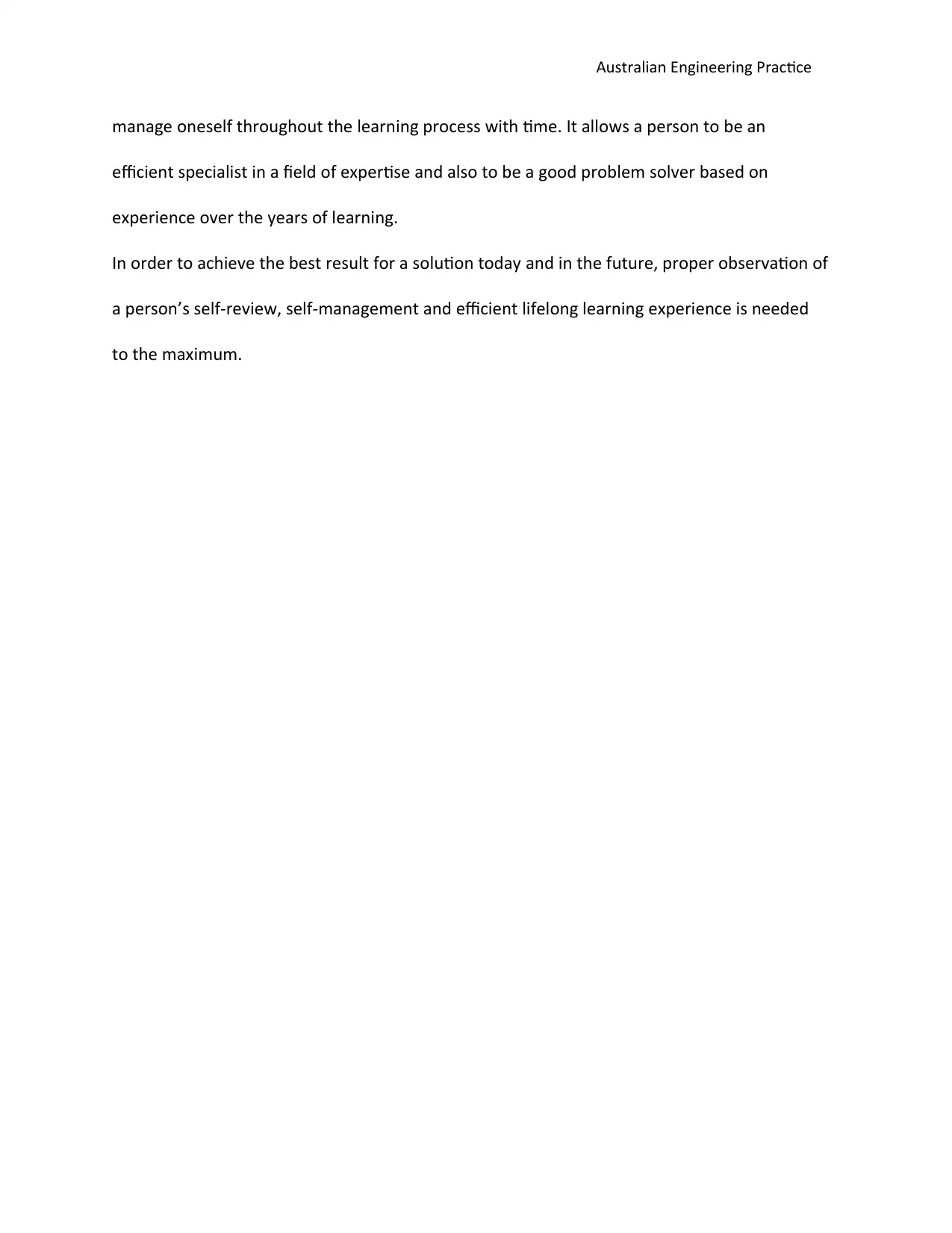
Australian Engineering Practice
manage oneself throughout the learning process with time. It allows a person to be an
efficient specialist in a field of expertise and also to be a good problem solver based on
experience over the years of learning.
In order to achieve the best result for a solution today and in the future, proper observation of
a person’s self-review, self-management and efficient lifelong learning experience is needed
to the maximum.
manage oneself throughout the learning process with time. It allows a person to be an
efficient specialist in a field of expertise and also to be a good problem solver based on
experience over the years of learning.
In order to achieve the best result for a solution today and in the future, proper observation of
a person’s self-review, self-management and efficient lifelong learning experience is needed
to the maximum.
Paraphrase This Document
Need a fresh take? Get an instant paraphrase of this document with our AI Paraphraser
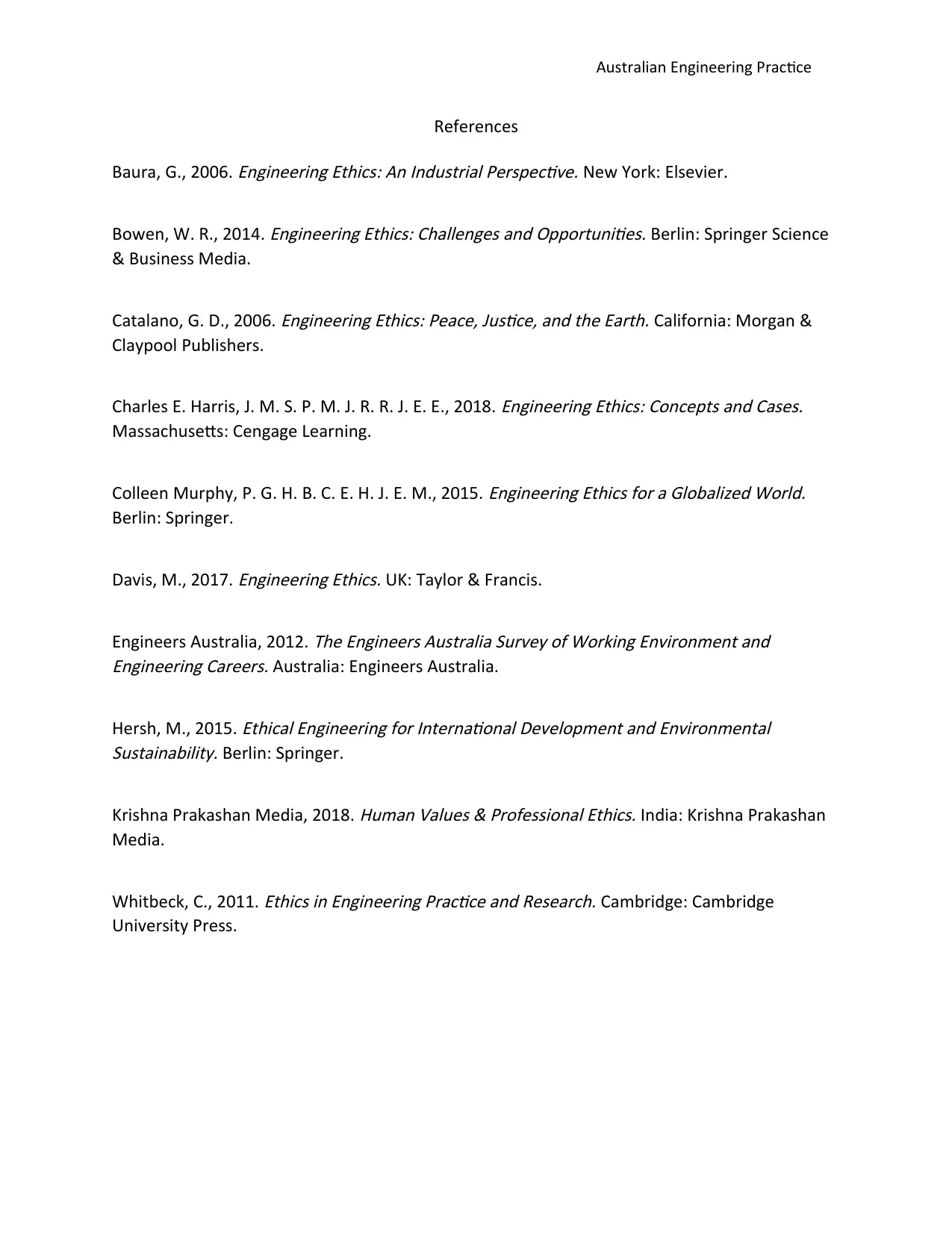
Australian Engineering Practice
References
Baura, G., 2006.
Engineering Ethics: An Industrial Perspective. New York: Elsevier.
Bowen, W. R., 2014.
Engineering Ethics: Challenges and Opportunities. Berlin: Springer Science
& Business Media.
Catalano, G. D., 2006.
Engineering Ethics: Peace, Justice, and the Earth. California: Morgan &
Claypool Publishers.
Charles E. Harris, J. M. S. P. M. J. R. R. J. E. E., 2018.
Engineering Ethics: Concepts and Cases.
Massachusetts: Cengage Learning.
Colleen Murphy, P. G. H. B. C. E. H. J. E. M., 2015.
Engineering Ethics for a Globalized World.
Berlin: Springer.
Davis, M., 2017.
Engineering Ethics. UK: Taylor & Francis.
Engineers Australia, 2012.
The Engineers Australia Survey of Working Environment and
Engineering Careers. Australia: Engineers Australia.
Hersh, M., 2015.
Ethical Engineering for International Development and Environmental
Sustainability. Berlin: Springer.
Krishna Prakashan Media, 2018.
Human Values & Professional Ethics. India: Krishna Prakashan
Media.
Whitbeck, C., 2011.
Ethics in Engineering Practice and Research. Cambridge: Cambridge
University Press.
References
Baura, G., 2006.
Engineering Ethics: An Industrial Perspective. New York: Elsevier.
Bowen, W. R., 2014.
Engineering Ethics: Challenges and Opportunities. Berlin: Springer Science
& Business Media.
Catalano, G. D., 2006.
Engineering Ethics: Peace, Justice, and the Earth. California: Morgan &
Claypool Publishers.
Charles E. Harris, J. M. S. P. M. J. R. R. J. E. E., 2018.
Engineering Ethics: Concepts and Cases.
Massachusetts: Cengage Learning.
Colleen Murphy, P. G. H. B. C. E. H. J. E. M., 2015.
Engineering Ethics for a Globalized World.
Berlin: Springer.
Davis, M., 2017.
Engineering Ethics. UK: Taylor & Francis.
Engineers Australia, 2012.
The Engineers Australia Survey of Working Environment and
Engineering Careers. Australia: Engineers Australia.
Hersh, M., 2015.
Ethical Engineering for International Development and Environmental
Sustainability. Berlin: Springer.
Krishna Prakashan Media, 2018.
Human Values & Professional Ethics. India: Krishna Prakashan
Media.
Whitbeck, C., 2011.
Ethics in Engineering Practice and Research. Cambridge: Cambridge
University Press.
1 out of 8
Related Documents
Your All-in-One AI-Powered Toolkit for Academic Success.
+13062052269
info@desklib.com
Available 24*7 on WhatsApp / Email
![[object Object]](/_next/static/media/star-bottom.7253800d.svg)
Unlock your academic potential
Copyright © 2020–2026 A2Z Services. All Rights Reserved. Developed and managed by ZUCOL.





